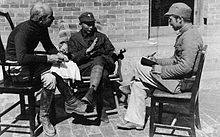
My reflections today on are Norman Bethune, one of Canada’s forgotten heroes. I first heard about him via my friend the Montreal sculptor, Stanley Lewis, who took me down to the statue of Bethune at Guy Concordia metro, where the homeless and pigeons sleep, which I found fitting as Stanley told me Bethune's story
The ONF made a documentary on him in 1964 which was directed by Donald Brittain. The film includes interviews with many people close to Bethune, including his biographer Ted Allan, and can be viewed on the website
http://www.nfb.ca/film/bethune/
All I can really add is that he has been my favorite Canadian since Stanley introduced me to him many years ago. And would very much like to do something on him and the hospital system in China which is INCREDIBLE. This is his lasting legacy, what he instilled in the Chinese doctors.
For those who do not know:
(Wikipedia entry)
Bethune was a Canadian physician, medical innovator, and noted anti-fascist. It was his service with the Communist Eighth Route Army (Ba Lu Jun) during the Second Sino-Japanese War that would earn him enduring acclaim. Dr. Bethune effectively brought modern medicine to rural China and often treated sick villagers as much as wounded soldiers. His selfless commitment to the Chinese people made such an impression on Mao Zedong that generations of Chinese students were required to memorise the Chairman's eulogy to him.
A prominent communist and veteran of the First World War, he wrote that wars were motivated by profits, not principles. Statues in his honor can be found in cities throughout China. (Wikipedia)
He wrote haunting anti-war poems such as this:
And this same pallid moon tonight,
Which rides so quietly, clear and high,
The mirror of our pale and troubled gaze,
Raised to a cool Canadian sky.
Above the shattered mountain tops,
Last night, rose low and wild and red,
Reflecting back from her illumined shield,
The blood bespattered faces of the dead.
To that pale disc, we raise our clenched fists,
And to those nameless dead our vows renew,
Comrades, who fought for freedom and the future world,
Who died for us, we will remember you.
Virtually unknown in his homeland during his lifetime, Bethune received international recognition when Chairman Mao Zedong of the People's Republic of China published his essay entitled In Memory of Norman Bethune (Chinese: 紀念白求恩), which documented the final months of the doctor's life in China. Almost the entire Chinese population knew about the essay which had become required reading in China's elementary schools during the 1960s. Grateful for Bethune’s altruistic help to China, the nation's normal elementary school textbook still has the essay today.
THIS IS TOTALLY TRUE. When you ask anyone about Bethune, young or old from any walk of life, a wide smile or acknowledgment pours over their face - sure they know Bethune - makes me feel proud. And yes, I have seen many statues of him, I go hunting when I see a hospital, Beijing, Nanjing, Qingdao, there he is standing at the portal, usually surrounded by magnificent flowers in a flower bed....graciously looking not down at us, but sculpted so he looks at us...and then beyond .
